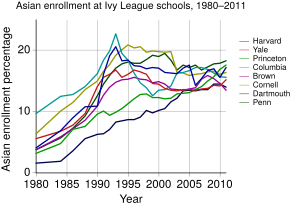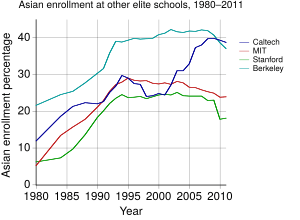Asian quota facts for kids
An Asian quota refers to the idea that some colleges in the United States might have limited the number of students of Asian descent they admit. This idea often comes up when talking about college admissions, especially at well-known schools like those in the Ivy League. People who believe in an Asian quota say it affects Asian American students, particularly those from East Asian and South Asian backgrounds.
These claims of unfair treatment have been around since the late 1980s. However, universities in the U.S. have always said they do not discriminate. Some people compare these claims to earlier times when it was believed that Jewish students faced similar limits in college admissions. While those limits were denied back then, many now agree they existed. Because of this, some have called Asian Americans "The New Jews" in university admissions.
People who think an Asian quota exists point to certain facts. For example, they say that Asian students who get into these colleges often have higher test scores than the average student admitted. This suggests a possible unfairness or "bamboo ceiling" against Asian applicants. These claims have led to government investigations and lawsuits. As of 2017, some smaller findings supported these claims, but no major court decisions have confirmed a widespread quota.
Contents
What is an Admissions Quota?
A quota in college admissions means setting a fixed limit on how many students from a certain group can be accepted. For example, if a college had a quota for Asian students, it might decide to admit only a certain percentage of them, no matter how many qualified Asian students apply. This is different from considering a student's background as one of many factors in their application.
Why is This a Big Deal?
The idea of an Asian quota is a big deal because it suggests unfairness in how students are chosen for college. Getting into a good college can greatly affect a person's future. If a group of students is unfairly limited, it can impact their opportunities. This topic is also sensitive because it involves race and how colleges decide who gets in.
Do Colleges Deny Quotas?
Ivy League universities and other colleges strongly deny that they have an Asian quota. They say they use a "holistic admission" process. This means they look at many different things when deciding who to admit. They consider not just grades and test scores, but also essays, extracurricular activities, recommendations, and a student's background.
Colleges argue that if Asian students who get in have higher test scores, it doesn't mean there's a quota. They say it might just mean that Asian applicants, as a group, tend to have higher test scores. So, a student who is just barely admitted might have strong test scores but be less strong in other areas compared to other applicants.
What the Law Says About Admissions
In the United States, it is against the law for colleges to use racial quotas when admitting students. This was decided in a famous court case called Regents of the University of California v. Bakke in 1978. This rule was confirmed again in 2013 by the case Fisher v. University of Texas.
However, the law does allow colleges to consider a student's race as one factor among many in admissions. This is part of what is known as affirmative action. The goal of affirmative action is to create a diverse student body.
Lawsuits Against Colleges
Because of these laws, several lawsuits have been filed against universities. One well-known case is Students for Fair Admissions v. President and Fellows of Harvard College. In this lawsuit, Harvard University was accused in 2018 of lowering the application scores of Asian American students. The goal, it was claimed, was to reduce the number of Asian American students admitted.
The United States Justice Department later stated that Harvard could not prove they did not discriminate based on race during their admissions process. These lawsuits highlight the ongoing debate about fairness and race in college admissions.



